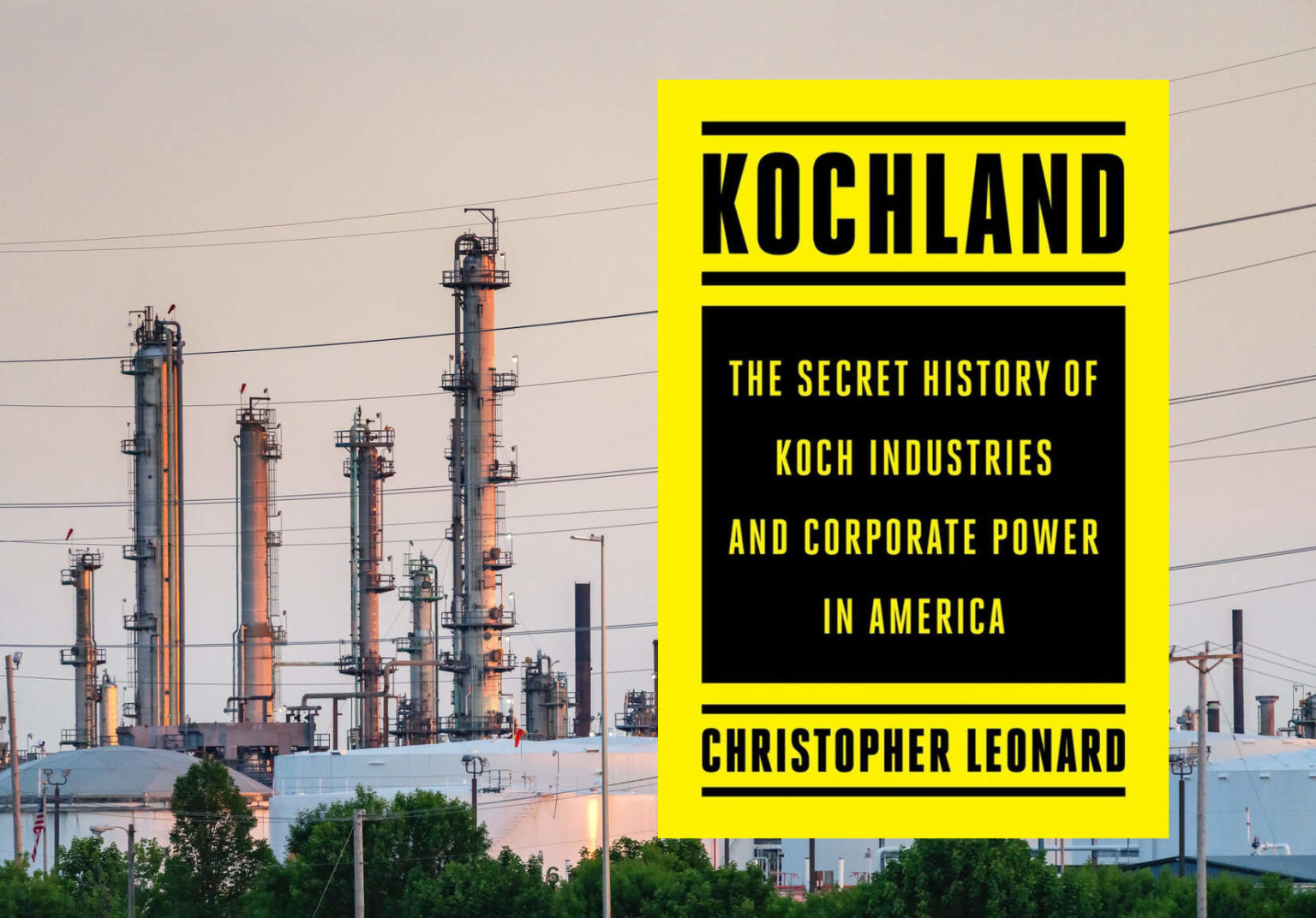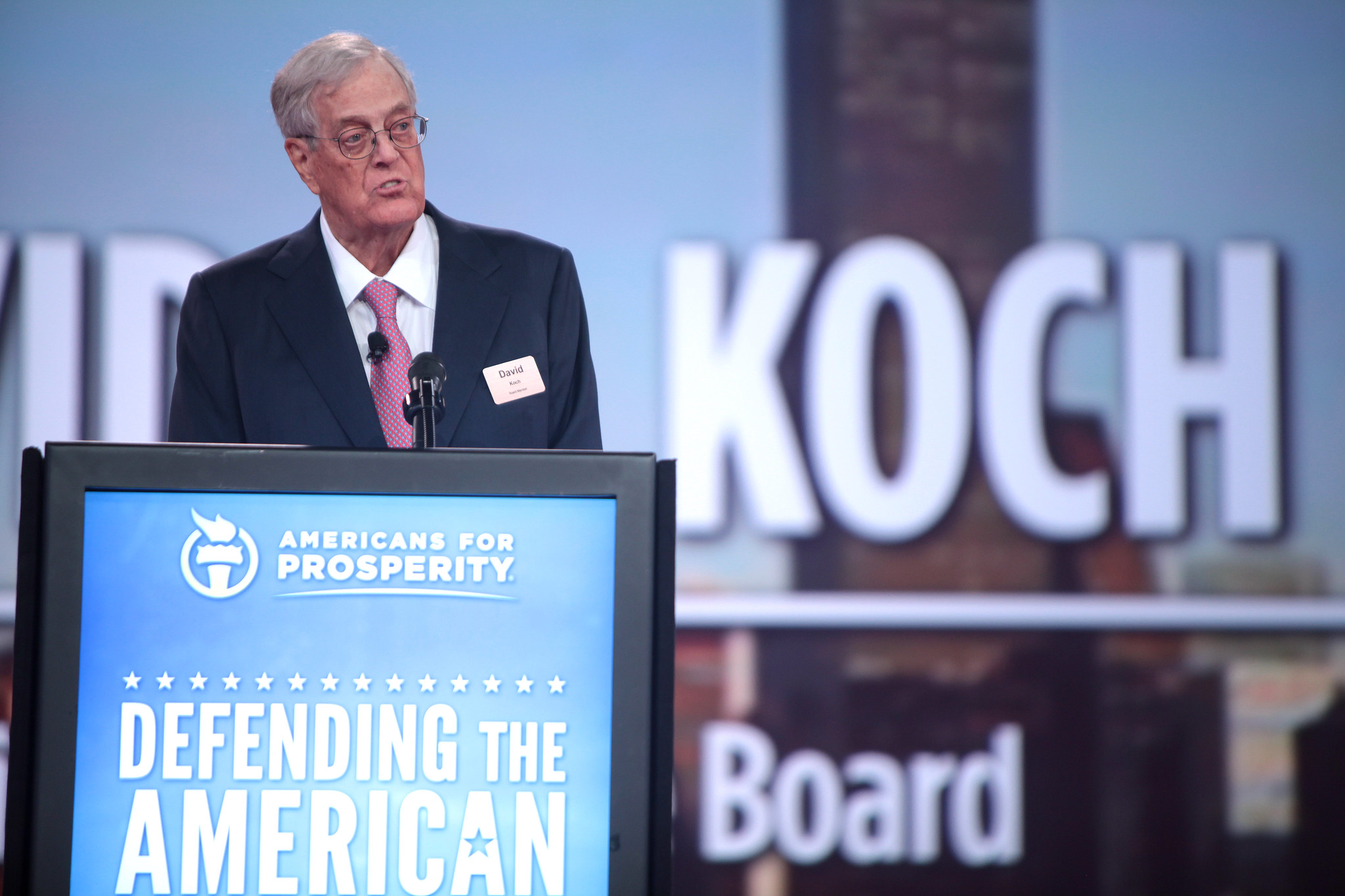Christopher Leonard’s new book, Kochland: The Secret History of Koch Industries and Corporate Power in America, begins, appropriately enough, with an FBI agent, who is investigating criminal activity by the company, standing in a field with a pair of binoculars, trying to catch a glimpse of the daily operations of a company that prizes secrecy.
Koch Industries was under investigation for theft of oil from the Osage and other Indigenous nations. Walking into the company’s office building involved passing through security checkpoints, Leonard explains, so numerous that one investigator later told Leonard that it “reminded him of traveling to CIA headquarters in Langley, Virginia.”
Through exhaustive reporting and extraordinary interviews with past and current company executives, including some turned whistleblower, Kochland offers readers a view far larger than can be seen through binocular lenses, walking readers past those layers of security checkpoints and into the inner workings of an institution that has for decades tirelessly built itself into practically all American lives, while largely evading accountability or transparency.
While Charles and David Koch’s political operations have been the subject of powerful investigative reporting by the New Yorker‘s Jane Mayer, author of the landmark book Dark Money, and numerous others, Leonard probes into the business that not only funds the Koch political machine, but also represents the clearest embodiment of the Kochs’ market fundamentalist political philosophy in action.
The Invisible Elephant in the Room
In 1961, when Charles Koch joined his father Fred — a founder of the John Birch Society who had, as Mayer reported, previously helped Hitler and Stalin build out their oil refineries, Koch Industries, was generating $3.5 million in profit a year, Leonard writes.
By the end of the Obama administration, company had grown enough to leave Charles and David Koch with personal fortunes of $81 billion (contrasted against Bill Gates’ $81 billion). Koch Industries says its workforce now numbers 130,000 people worldwide, roughly half of those in the U.S., and that it operates today in 60 countries.
As much as it is mammoth — its “annual revenues are larger than that of Facebook, Goldman Sachs, and U.S. Steel combined,” Leonard told NPR — if Koch Industries is the elephant in the room, it has sought to master the art of being a virtually invisible one.
That inconspicuousness is built into its business model. The company invests little in consumer brands and largely acts as industrialization’s middleman, churning raw fossil fuels into not only gasoline at its Pine Bend refinery in Minnesota, but also into the ingredients that become our buildings, our clothing, and other items that we may not know about because even those who closely track the Kochs’ politics have been unable to trace (are they involved with fracking, for example? A definitive answer is surprisingly hard to come by, says Koch Docs director Lisa Graves).
Koch Industries is also omnipresent in the agricultural machine that, in Leonard’s words, has become “one immense machine that laundered energy from fossil fuels into food calorie energy that humans could eat,” thanks to natural gas–based fertilizers. Not only does it manufacture those fertilizers, it produces livestock feed, cattle, and even the disposable plate you might eat your meal from.
Leonard describes how Charles Koch sought to grow and harness the entrepreneurial spirit of his management staff by treating them like small business owners, attuned not to performance metrics or budgets but directly to the company’s profits and losses — with the key difference being that the privately held Koch Industries, not workers or management, are reaping the profits.
“What resulted was a kind of perpetual motion machine,” Leonard writes of one era in the company’s history, “a company that grew and then cited that growth as justification to grow faster.”
The 704-page book offers an inside-the-fenceline view of how that company has operated and grown over the years, including a blow-by-blow account of how Koch Industries sought to break the back of a refinery workers’ union in the 1970s. Leonard presents readers with a riveting narrative of “the war for Pine Bend,” including helicopter airlifts and the apparent attempted sabotage of the refinery via a runaway diesel train engine.
Shrouded in Secret, Beyond Consumer Reproach
In Kochland, it seems, the only form of accountability that executives recognize as important comes from business losses.
As a private firm, Koch Industries faces none of the reporting requirements that publicly traded companies must meet — Leonard recounts how during a 1989 deposition, Charles Koch was forced to reveal sales and profit figures, which Leonard writes were “considered top secret” by the company, but for a publicly traded firm, a widely available set of numbers.
Koch Industries eludes consumer boycotts by selling products that are inescapably entwined in the infrastructure of daily American life. As much as any single organization, Koch Industries has made any problems it is responsible for — intentionally, in Leonard’s telling — structural, problems that cannot be addressed through individual consumer action.
When it comes to environmental accountability, Leonard diagnoses structural issues inside the company in the 1990s that facilitated law breaking. In a fascinating chapter, Leonard offers readers an account of Koch Industries deliberately and repeatedly spewing contaminated wastewater into wetlands in Minnesota, a major violation of environmental law to which the company pled guilty in 1999.
“The company learned that violating regulations could put a dent in its profit margins, and responded accordingly,” Jennifer Szalai wrote in a New York Times review of Kochland. “It now imprints upon employees the need for ‘10,000 percent compliance’: obeying 100 percent of the laws 100 percent of the time.”
That narrative isn’t a perfect fit for the facts — just a year later, Koch pled guilty to falsifying documents and settled with the Justice Department for $20 million over benzene pollution in Corpus Christi, Texas, and an attempted cover-up, according to Greenpeace.
And 10 years later, a Koch subsidiary reached a deal with the U.S. Environmental Protection Agency and Department of Justice over environmental law-breaking that spanned seven states. Those violations resulted in a $1.7 million fine and $500 million in repair obligations, Greenpeace adds as it details both accidental spills or leaks and toxic pollution (at times with the permission of state regulators) that have sickened those living around the plants.
If anything, what Koch Industries seemed to learn from costly environmental fines and settlements is that it can be cheaper to change the law today than it is to pay the fine tomorrow. Leonard details how, for example, the Kochs began, via a nonprofit group, to sponsor free educational events for judges, hosted in luxurious locales, which organizers said by 2016 had attracted more than 4,000 state and federal judges from every part of the country.
Power in Politics
The Kochs’ power as political actors is, of course, notoriously non-transparent — which can conceal not only the mechanisms they use for leverage, but also the degree of self-interest that may motivate their work.
David Koch speaking at the 2015 Defending the American Dream Summit at the Greater Columbus Convention Center in Columbus, Ohio. Credit: Gage Skidmore, CC BY–SA 2.0
While the Kochs have labored strenuously to market themselves as sincere ideological Libertarians, defending personal freedom (for property owners, at least) against government encroachment, their agenda is interwoven with threads of visible self-interest.
From their earliest forays into politics — like David Koch’s failed 1980 Libertarian party vice-presidential bid as part of a campaign that championed abolishing the Department of Energy — the political platforms they support consistently seem to include planks that would benefit the Kochs’ business. (And in cases where their business interests and ideologies might conflict, it may be worth bearing in mind that the Kochs who Leonard describes are adept at strategizing with a long-range view, accepting short-term losses at times in the pursuit of longer-term gains.)
That long-range strategy extends to the Koch network’s stance on climate change — and here, Mayer credits Leonard’s book with breaking new ground, demonstrating that when it comes to opposing action on climate change, “their role went as far back as 1991.”
“If there is any lingering uncertainty that the Koch brothers are the primary sponsors of climate-change doubt in the United States, it ought to be put to rest by the publication of “Kochland,” Mayer wrote in the New Yorker. “Magnifying the Kochs’ power was their network of allied donors, anonymously funded shell groups, think tanks, academic centers, and nonprofit advocacy groups, which Koch insiders referred to as their ‘echo chamber.’”
Koch Docs, an online archive launched August 9, has collected many of the documents used by Leonard and others to understand how Charles Koch and his company operate.
‘Block and Tackle’ Under Trump
When it comes to the Trump administration, the focus of the book’s final chapters, Leonard compares the Koch strategy to a “block and tackle” system — in the sense that by working to block certain policies and offer the administration assistance tackling others, it’s possible to create a path of least interference for the administration that runs right where Koch desires.
“I’m more excited about what we’re doing and about the opportunities than I’ve ever been,” Leonard quotes Charles Koch as saying during a January 2018 meeting of Koch network donors in Palm Springs. “We’ve made more progress in the last five years than I had in the previous fifty.”
While Kochland goes a long way towards letting readers peer inside the windows of Koch Towers, much remains unknown about the organization, despite the efforts of Leonard and many others. But Kochland chips away at a significant portion of the opaque layer that’s shielded the Kochs from scrutiny.
Leonard’s work leaves open a question for readers — once you’ve had a glimpse inside the Kochs’ private capitalist empire, is it a place you want to live?
Because when it comes to both politics and consumerism, Leonard’s book suggests that an ever-expanding Kochland just might become inescapable.
Main image: Kochland book cover over original image of the Pine Bend oil refinery, one of many Koch businesses profiled in Kochland. Credit: Tony Webster, CC BY–SA 2.0
Subscribe to our newsletter
Stay up to date with DeSmog news and alerts








